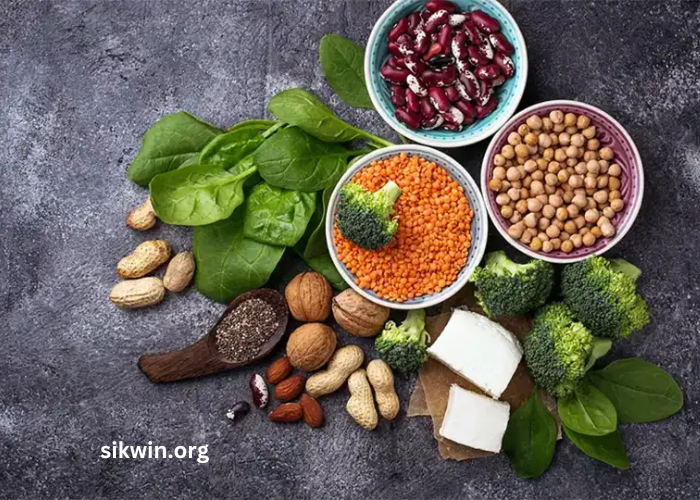Protein is essential for building and repairing tissues in the body, as well as for other critical bodily functions such as hormone production and immune system support. For individuals who follow a vegetarian or plant-based diet, finding reliable sources of protein is crucial to ensure they meet their daily nutritional needs.Â
Thewellhealthorganic.com: Vegetarian Protein Source Archives offers a comprehensive collection of information and resources on a variety of plant-based proteins. Whether you are looking for plant-based alternatives to animal proteins or simply seeking more variety in your meals, this archive provides essential knowledge for maintaining a healthy, balanced diet.
In this article, we will explore some of the top vegetarian protein sources featured in thewellhealthorganic.com: Vegetarian Protein Source Archives, their nutritional benefits, and how you can incorporate them into your daily meals. Understanding how to source quality protein from plants not only supports overall health but also aligns with sustainability and ethical eating practices, making vegetarian protein choices even more attractive to today’s conscious eaters.
What Are the Best Sources of Protein in a Vegetarian Diet?
One of the most common concerns for vegetarians is ensuring they get enough protein from their diet. Thewellhealthorganic.com: Vegetarian Protein Source Archives highlights a variety of plant-based options to help individuals meet their protein needs. Some of the most popular vegetarian protein sources include beans, lentils, chickpeas, quinoa, and tofu. These foods are rich in protein and offer a wide range of other nutrients, making them excellent choices for those who do not consume animal products.
In addition to these staples, thewellhealthorganic.com: Vegetarian Protein Source Archives also includes information on more specialized sources of plant-based protein. For example, nuts and seeds like almonds, chia seeds, and hemp seeds are packed with protein and healthy fats. Including a variety of these sources in your meals ensures that you’re not only getting enough protein but also enjoying a well-rounded, nutrient-dense diet that supports overall health.
How Can Vegetarians Ensure They Get Enough Protein?
Ensuring adequate protein intake on a vegetarian diet is possible with proper planning. Thewellhealthorganic.com: Vegetarian Protein Source Archives emphasizes the importance of including a variety of plant-based proteins in your meals to cover all essential amino acids. Unlike animal proteins, many plant proteins are incomplete, meaning they do not contain all nine essential amino acids. However, by combining different protein sources, such as rice and beans or hummus and pita, vegetarians can obtain a complete protein profile.
Meal planning is another key strategy for meeting protein needs. Thewellhealthorganic.com: Vegetarian Protein Source Archives offers suggestions for incorporating high-protein plant-based foods into every meal, whether it’s breakfast, lunch, or dinner. By including foods such as edamame, tempeh, or peanut butter, vegetarians can easily boost their protein intake without feeling restricted by their dietary choices.
What Are the Nutritional Benefits of Vegetarian Protein Sources?
Vegetarian protein sources offer a variety of health benefits beyond just protein content. Thewellhealthorganic.com: Vegetarian Protein Source Archives highlights how plant-based proteins often come with added fiber, vitamins, and minerals. For example, beans and lentils are rich in fiber, which promotes digestive health and helps maintain steady blood sugar levels. They are also high in iron and magnesium, essential nutrients that support energy production and muscle function.
Incorporating plant-based proteins into your diet can also support heart health. Many vegetarian protein sources, such as nuts, seeds, and tofu, contain healthy fats like omega-3 fatty acids that can lower cholesterol and reduce inflammation. Thewellhealthorganic.com: Vegetarian Protein Source Archives provides a wealth of information on how these plant-based options can not only help meet protein needs but also contribute to a healthier lifestyle overall.
How Can I Incorporate More Vegetarian Protein into My Diet?
Thewellhealthorganic.com: Vegetarian Protein Source Archives offers practical tips for incorporating more vegetarian protein into your diet. One easy way to boost protein intake is by adding plant-based protein powders to smoothies or baked goods. These powders, made from peas, rice, or hemp, are an excellent way to add protein to your diet without altering the taste or texture of your meals.
Additionally, the archive suggests experimenting with plant-based meat substitutes such as tempeh, seitan, or veggie burgers. These alternatives can be used in place of meat in most recipes and provide a significant amount of protein. Whether you’re preparing a hearty stir-fry, soup, or salad, these ingredients make it easy to enjoy delicious meals while meeting your protein needs.
What Are Some Common Myths About Vegetarian Protein?
There are several misconceptions about vegetarian protein, and thewellhealthorganic.com: Vegetarian Protein Source Archives addresses some of the most common myths. One of the biggest misconceptions is that vegetarians cannot get enough protein from plants. However, as the archive explains, there are plenty of protein-rich plant foods that can meet or even exceed the protein content of animal products.
Another common myth is that plant-based proteins are incomplete and cannot provide all the essential amino acids. In reality, combining different plant proteins throughout the day allows vegetarians to get a complete amino acid profile. Thewellhealthorganic.com: Vegetarian Protein Source Archives clarifies that as long as a variety of plant-based foods are consumed, vegetarians can get all the essential nutrients they need to thrive.
Conclusion
In conclusion, thewellhealthorganic.com: Vegetarian Protein Source Archives offers a wealth of valuable information on plant-based proteins, their nutritional benefits, and how to incorporate them into your daily diet.Â
By choosing from a wide variety of vegetarian protein sources, individuals can ensure they are meeting their protein needs while also supporting overall health. Whether you’re new to vegetarian eating or looking to expand your protein options, the archive provides the knowledge you need to make informed decisions and enjoy a balanced, nutritious diet.




